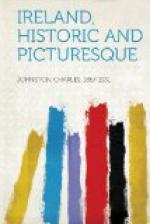Though the personalities of this age do not stand forth with the high relief of Cuculain and Concobar, though we can hardly quote poems to equal the songs of Find son of Cumal and Ossin of the golden tongue, yet genuine inspiration never failed in the hearts of the warriors and on the lips of the bards. Thus in 860 did a poet lament the death of a king:
“Mournfully is
spread her veil of grief over Erin
Since Maelseaclain,
chieftain of our race has perished,—
Maelseaclain of the
flowing Shannon.
Many a moan resounds
in every place;
It is mournful news
among the Gael.
Red wine has been spilled
into the valley:
Erin’s monarch
has died.
Though he
was wont to ride a white charger.
Though he had many steeds,
His car this day is
drawn by a yoke of oxen.
The king of Erin is
dead.”
Four years afterwards the contest between the raiders and the chieftains grew keener, more centered, more like organized war. “A complete muster of the North was made by Aed Finnliat, so that he plundered the fortresses of the foreigners, wherever they were in the north; and he carried off their cattle and accoutrements, their goods and chattels. The foreigners of the province came together at Lough Foyle. After Aed king of Ireland had heard that this gathering of strangers was on the borders of his country, he was not negligent in attending to them. For he marched towards them with all his forces, and a battle was fought fiercely and spiritedly between them. The victory was gained over the foreigners, and a slaughter was made of them. Their heads were collected to one place, in the presence of the king, and twelve-score heads were reckoned before him, which was the number slain in that battle, besides the numbers of those who were wounded and carried off by him in the agonies of death, and who died of their wounds some time afterwards.”
A renewal of tribal warfare in the second year after this, when this same Aed the king was attacked by Flann the lord of Breag in Meath, called forth certain battle-verses full of the fire and fervor of the time.
A poet sang:
“At Kiladerry this day the
ravens shall taste sips of blood:
A victory shall be gained over the magic host
of the Gentiles
and over Flann.”
The mother of Flann sang:
“Happiness! Woe!
Good news! Bad news! The gaining of a great
triumphant battle.
Happy the king whom it makes victorious;
unhappy the king who
was defeated.
Unhappy the host of Leat Cuin,
to have fallen by the sprites
of Slain;
Happy the reign of great Aed, and unhappy the loss of Flann.”
Aed the victorious king sang:
“The troops of Leinster
are with him, with the added men of
swift Boyne;
This shows the treachery of Flann:
the concord of Gentiles
at his side.”




